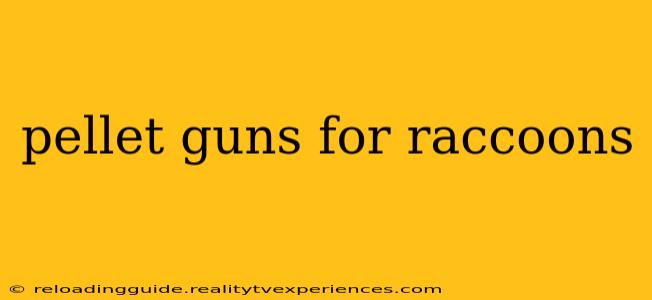Raccoons, while undeniably cute, can quickly become significant pests. Their nocturnal habits, penchant for trash, and potential to damage property often lead homeowners to seek effective control methods. Pellet guns are frequently considered, but choosing the right one and using it responsibly is crucial. This guide explores the use of pellet guns for raccoon control, emphasizing humane practices and legal considerations.
Understanding the Role of Pellet Guns in Raccoon Control
Pellet guns, also known as air rifles, offer a potentially effective method for deterring or eliminating raccoons. However, it's paramount to understand that this isn't a first-line solution. Before considering lethal force, explore non-lethal options:
- Exclusion: This involves sealing entry points to your home, attic, or other areas where raccoons are accessing. This prevents future problems and is the most humane approach.
- Repellents: Commercial repellents, such as those containing predator urine or strong scents, can deter raccoons from specific areas.
- Trapping and Relocation: Live traps, followed by relocation to a suitable habitat far from your property, are a humane alternative to lethal methods. However, local regulations often restrict relocation.
Only after exhausting these options should you consider using a pellet gun. Even then, careful consideration is required.
Choosing the Right Pellet Gun for Raccoon Control
Selecting an appropriate pellet gun for raccoon control requires understanding power, accuracy, and ethical implications. Factors to consider include:
- Caliber: .177 caliber pellet guns are generally insufficient for effective raccoon control. Larger calibers, such as .22 or even .25, are more likely to provide a humane kill, though this depends heavily on shot placement.
- Power: A higher-powered air rifle (measured in FPS – feet per second) is essential for a clean and quick kill. Lower power guns may cause unnecessary suffering.
- Accuracy: Precision is critical for ethical and effective control. A rifle with good accuracy significantly reduces the likelihood of a wounded animal escaping and suffering.
- Range: Consider the distance you'll need to shoot from. Accurate shots at longer ranges require a higher level of skill and a more powerful rifle.
Important Note: Using a pellet gun requires a high level of skill and responsibility. Improper use can lead to wounded animals, property damage, or even injury to people.
Legal and Ethical Considerations
Before using a pellet gun for raccoon control, familiarize yourself with local and state laws. Regulations regarding the use of air rifles for pest control vary significantly. Failing to comply with these regulations can result in substantial fines or legal penalties. Additionally, ethical considerations are paramount. Ensure you can make a clean, humane kill to minimize animal suffering. If you're unsure about your ability to do so, lethal control may not be the right option for you.
Alternatives to Pellet Guns
If you're uncomfortable with lethal methods, or if local laws prohibit their use, consider these alternatives:
- Professional Wildlife Removal: Hiring a professional wildlife removal service is often the safest and most effective solution. These services are experienced in handling raccoons humanely and legally.
- Havahart Traps: These traps humanely capture raccoons without harming them, allowing for relocation or contact with animal control.
Conclusion
Pellet guns can be an effective tool for raccoon control in certain situations, but they should only be considered as a last resort after exhausting all other humane and non-lethal methods. Careful consideration of legal restrictions, ethical implications, and the need for accurate and powerful equipment is crucial. If you're uncertain about any aspect of using a pellet gun for raccoon control, seek professional assistance or explore alternative methods. The welfare of the animal should always be the primary concern.

